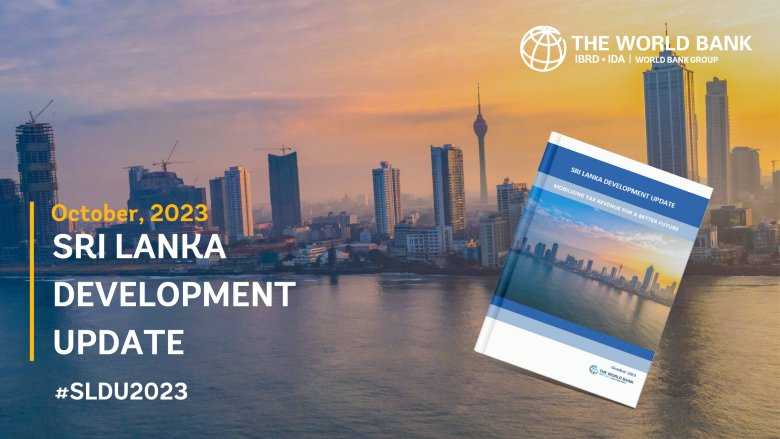
World Bank Sri Lanka Update: Revenues underperformed, interest bill absorbed the total government revenue
By Staff Writer
The World Bank (WB) issued its Development Update on Sri Lanka on Tuesday (03) and stated the country’s “macroeconomic outlook remains uncertain, contingent on successful debt restructuring and structural reforms.”
Sri Lanka’s economic crisis in 2022 was exacerbated by structural weaknesses, leading to high fiscal deficits and risky commercial borrowing. The country’s debt reached 118.7% of GDP in 2022, and the foreign exchange liquidity constraint caused shortages of essential inputs. The economy contracted by 7.8% in 2022, and poverty doubled from 13.1 in 2021 to 25%. Inflation peaked at 69.8% in September 2022, and the currency depreciated by 81%, the report reveals.
In the first half of 2023, the economy showed initial signs of stabilization, with critical reforms such as cost-reflective utility pricing, new revenue measures, a floating currency, and monetary tightening. Industrial activity declined by 18.3 percent in first half of 2023, due to contractions in construction, and manufacturing, which were affected by shrinking private credit, shortages of inputs, and supply chain disruptions.While primary deficit declined in the first four months of 2023, and external trade remained subdue, however, “revenue collection in the first four months of 2023 remains significantly below the approved budget.“
The Bank recommends that swift and deep debt restructuring is needed to restore Sri Lanka’s debt sustainability and regain access to international financial markets. The IMF’s Extended Fund Facility program sets targets to restore debt sustainability, and discussions are ongoing with France, India, Japan, and China. The government is implementing a domestic debt optimization strategy to reduce annual gross financing needs by 1.5 percent of GDP in 2027-2032.
The outlook for Sri Lanka’s growth is uncertain due to significant uncertainty surrounding debt restructuring and structural reforms. Inflation is expected to remain in the single digits due to weak demand and waning fiscal deficit monetization. Poverty is expected to increase in 2023 before declining over the medium term. The current account deficit will narrow further in 2023 due to liquidity constraints, but remain benign thereafter with recovery in tourism and remittances. Debt restructuring and revenue-based fiscal consolidation are projected to reduce the overall balance in the medium term.
Downside risks remain high, including prolonged external debt restructuring, political deterioration, inadequate domestic revenue mobilization, limited external financing support, a sharper global slowdown, and a prolonged recovery from the crisis. The financial sector needs continuous monitoring due to high exposures to the public sector, rising non-performing assets, and tight liquidity conditions.
“Banks have been exempted from the Domestic Debt Optimization (DDO) strategy, but vulnerabilities in the financial sector are still high. The government DDO strategy, which excluded banks’ holdings of LKR-denominated Treasury securities, aims to avoid prohibitive contagion effects to the banking sector.2 However, financial sector conditions continued to deteriorate.”
Government imposed the burden of domestic debt restructuring only upon superannuation funds. Number of cases against this measure were thrown away by the supreme court without any explanation. Several other fundamental rights matters challenging this measure were taken up in the Supreme Court today and were postponed to January 23, 2024 for support.
Improved revenue mobilization performance is crucial for Sri Lanka’s return to macroeconomic stability. The country has one of the lowest tax-to-GDP ratios in the world due to poorly designed tax policies and chronic tax administration challenges. The government initiated a series of tax reforms in 2022-23 to enhance domestic revenue mobilization and strengthen the tax system.
The 2022-23 tax reform package has led to a 36.6 percent increase in nominal tax revenue collection, but the first four months of 2023 still fall short of the approved budget.
To ensure efficiency and sustainability, WB recommends, “capital taxation should be strengthened through progressive rates on capital income, revamping property taxation based on current market values of properties, and introducing wealth, gift, and inheritance taxes. Tax expenditures should also be rationalized and made more transparent through a comprehensive review of tax incentives and the regular publication of tax expenditure statements.”
It is significant to note the following observation in the Report: “a sharp increase in interest payments, due to high domestic interest rates, expanded the overall deficit by 57.3 percent (y-o-y). Broadly, the interest bill (one of the highest in the world) absorbed the total government revenue in the first four months of 2023.” This overall deficit has been financed through domestic banks and non-bank domestic sources including pension funds and other savings institutions.
Just days before, the International Monetary Fund too issued its assessment on Sri Lanka’s progress in the debt-restructuring process and has demanded the government’s stricter adherence to its pro-market structural adjustments. Called the Governance Diagnostic Assessment, the Technical Report says that it focused on corruption vulnerabilities and governance weaknesses linked to corruption in macroeconomically critical priority areas of: (i) the anti-corruption, anti-money laundering and combating the financing of terrorism; (ii) fiscal governance (e.g., public financial management, tax policy and revenue administration, state enterprise management, and public procurement); (iii) central bank governance; (iv) financial sector oversight; and (v) enforcement of contract and protection of property rights.
[Image Courtesy of WB Website]

